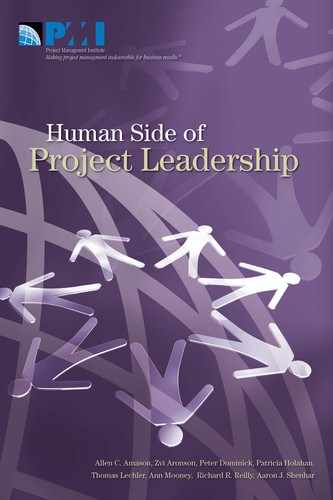CHAPTER 5
Discussion
The results from this investigation have theoretical and practical implications. They extend prior research on relationships between transformational leadership and unit/group level success. Previous studies had focused on performance of military units over relatively short time periods. This study focused on the performance of project teams in organizational settings; the measures of success are derived over relatively long periods of time (several months to a year). Our results suggest that transformational leadership differentially affects various measures of project success. We also examined the effects of three moderators (urgency, innovativeness, and project manager authority) on unit level performance. Our results suggest that these factors do not impact the relationship between transformational leadership and project success. Other project manager leadership behaviors, for example, transactional leadership, are correlated with project success. Also the literature on the success factors of project management offers a wide variety of possible behaviors (Murphy et al. 1974; Pinto 1986; Lipovetsky et al. 1997).
Our results do shed light on relationships between project manager authority and leadership behavior. This topic is particularly important for project managers who frequently find themselves in situations where they have to influence without being able to rely on formal authority. These results suggest that project managers can sometimes compensate for a lack of formal authority by developing their transformational leadership skills. In that regard, our findings also support the significance of leadership skills training and assessment for project managers, who in many organizations are still selected for their roles based largely upon their technical abilities.
Limitations
There are also, of course, several limitations that should be taken into account when considering the implications of our study. Although we have attempted to provide controls for performance, we cannot be certain that biases in assessments of leadership behavior (for example, performance measures were provided by senior managers and measures of leadership behavior were collected from project team members) were wholly eliminated. For instance, it is still possible that project team members had some awareness of the relative success or failure of the project when making their judgments about leadership.
It is also important to note that our analysis focuses only on transformational leadership behaviors, and in that sense is not an examination of full-range leadership theory. We do, however, include an assessment of some basic project management activities that we felt served as a more appropriate proxy for transactional leadership behaviors in the context of a project manager’s role.
Another limitation is that we found the dimensions of transformational leadership to be highly inter-correlated. Others have reported this as well (Yukl 2002), and this fact makes it hard to determine the effects of different facets of transformational leadership.
Finally, a larger sample size would also be helpful. The results of our research were based on a final sample of 60 project teams; however, results supported the hypothesized relations. Moreover, in comparison to other studies, our sample was larger than the average sample reported by Cohen and Bailey (1997) for project teams (average n = 45).
Future Research
Future research should take into account the limitations described above. In addition, our findings themselves offer some guidance for further investigations. In particular we encourage others to use organizational projects as a context for studying leadership behaviors. One of the topics to consider is the longitudinal effect of transformational leadership behavior. Might the duration of a project impact the effects of transformational leadership at different points in time? For instance, does transformational leadership matter more during the early stages of project, at later stages or does it impact performance differently across time? It would also be interesting to consider the impact of changes in project team membership. Also in project-based work, there are frequently changes in project managers. To what extent do the transformational leadership behaviors of one individual have a lasting effect even after others have assumed leadership for a project?
Future research might also examine other moderators, such as the sources of innovation. By source, we are referring to the extent to which, in the course of solving problems, project team members need to seek new knowledge and solutions through sources that were external to the team and perhaps even their organization. A team whose solutions are driven more through internal means should have greater freedom from extraneous influences and coordination-related conflicts (Pawar and Eastman 1997). In short, with all other things being equal, internally oriented teams would face less environmental uncertainty and consequently be less dependent upon transformational leadership. In contrast, those teams that have to spend greater amounts of time interacting with external parties in order to develop solutions should benefit more from the galvanizing effects of transformational leadership. In particular, behaviors related to inspirational motivation might be particularly relevant to the extent that they provide team members with a clear, engaging vision, help followers to focus their attention and appropriately model behaviors required for interacting effectively with others inside and outside of the project-team.
Finally, future studies might also examine other variables (for example, culture) that mediate the relationship between leader behavior and unit performance. For example, transformational leaders that engage in intellectual stimulation should be open to new ideas, emphasize the importance of seeking differing perspectives when solving problems, encourage non-traditional thinking to deal with traditional problems. These behaviors are central to norms associated with an adaptive culture (Kotter and Heskett 1990), and in turn should have a strong influence on project performance.
